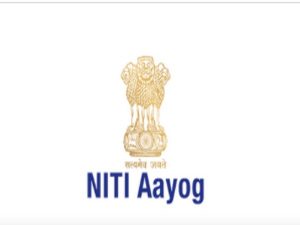CCUS Policy Framework And Its Deployment : NITI Aayog Report

NITI Aayog has released a study report, titled ‘Carbon Capture, Utilisation, and Storage (CCUS) Policy Framework and its Deployment Mechanism in India’.
- The report explores the importance of Carbon Capture, Utilisation, and Storage as an emission reduction strategy to achieve deep decarbonization from the hard-to-abate sectors.
Key Highlights of the Report:
- CCUS can provide a wide variety of opportunities to convert the captured CO2 to different value-added products like green urea, food and beverage form application, building materials, chemicals (methanol and ethanol), polymers (including bio-plastics) and enhanced oil recovery (EOR) with wide market opportunities in India, thus contributing substantially to a circular economy.
- CCUS projects will also lead to a significant employment generation. It estimates that about 750 mtpa of carbon capture by 2050 can create employment opportunities of about 8-10 million on full time equivalent (FTE) basis in a phased manner.
Carbon Capture, Utilization, and Storage:
- CCUS encompasses methods and technologies to remove CO2 from the flue gas and from the atmosphere, followed by recycling the CO2 for utilization and determining safe and permanent storage options.
- CO2 captured using CCUS technologies is converted into fuel (methane and methanol), refrigerants and building materials.
- CCUS is considered an important tool to help countries halve their emissions by 2030 and reach net-zero by 2050.
- These goals are crucial to meet the Paris Agreement targets for restricting global warming to 2 degrees Celsius (°C), and preferable to 1.5°C, over pre-industrial levels.




